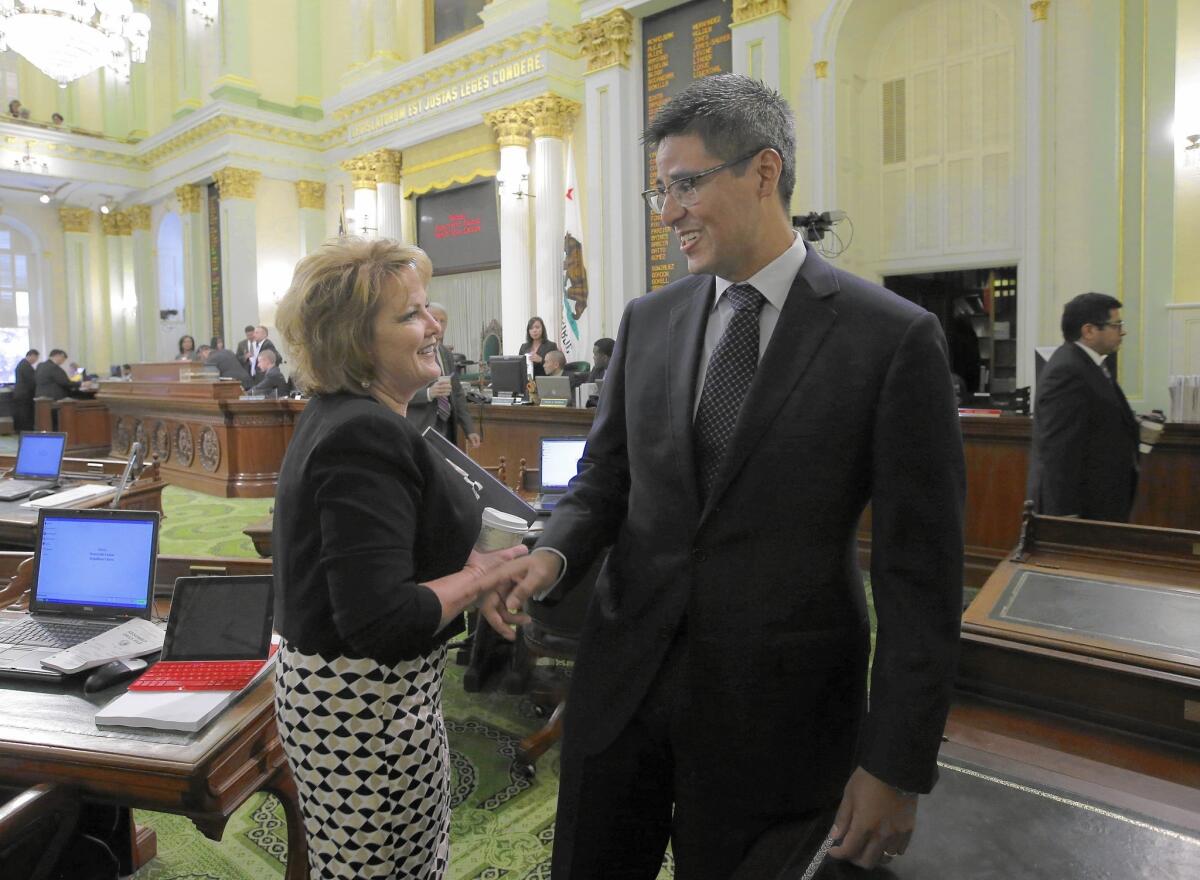Vote results prime new Legislature for GOP, Democratic cooperation

- Share via
reporting from SACRAMENTO — Stung by losses in the November election, the California Legislature’s Democratic majority arrives for the first day of a new session Monday facing a political terrain more hostile to tax increases and other priorities of liberal lawmakers.
The Democrats’ failure to win a supermajority in either the Senate or Assembly, after capturing both just two years ago, is expected to produce a more centrist agenda and give more clout to moderate Democrats and Republicans.
The political shift probably dooms the long-proposed revision to Proposition 13, the 1978 initiative that capped property tax hikes, said Larry Gerston, a political science professor at San Jose State.
“The Democrats had their chance with the bulletproof, absolute two-thirds majorities last year, but they were unwilling to pull the trigger,” Gerston said. “That window is now shut.”
Assemblyman Henry T. Perea (D-Fresno), who leads the moderate Democrats, said the subtle shift to the middle will be felt when energy issues come to the forefront during the upcoming, two-year legislative session.
Last year, he led a high-profile but unsuccessful effort to delay the inclusion of transportation fuels in the state’s cap-and-trade program to limit carbon emissions. He said to expect more “robust debate” about the state’s efforts to address climate change in the coming session.
“Nearly half the [Democratic] caucus could be considered more moderate than in the past, but I do think that, for example, a moderate in Fresno is going to be very different from a moderate in the Bay Area,” Perea said.
State law requires the Legislature to meet for one day in early December to convene the new session, swear in newly elected members and elect the leadership. Members will get a 2% pay raise Monday and can begin introducing bills, but the Legislature adjourns at the end of the day until Jan. 5, when the session begins in earnest.
Both houses will see some new leadership. Sen. Kevin De León (D-Los Angeles) is the new president pro tem of the Senate, and Assemblywoman Kristin Olsen of Modesto becomes the new Republican leader in the Assembly.
Senate Democrats start the new session with 25 of the 40 seats in the Senate, when 27 are needed for a supermajority; Republicans have 14. The Democrats have a 52-28 majority in the Assembly.
There is one vacancy in the Senate, caused by the resignation of Democratic Sen. Roderick Wright over criminal charges, and a Democrat is expected to win the Dec. 9 special election.
“I expect there will be a more deliberate pace with respect to policy-making next year, largely because the makeup of the Senate has changed,” said Senate Republican Leader Bob Huff of Diamond Bar.
“The voters sent a message by electing Republicans in key swing districts, which eliminated the Democrats’ supermajority, and it forces them to continue working with us,” he said. “And they clearly do not want any tax increases.”
When Democrats held a supermajority in both chambers in 2012, they had enough votes to approve tax increases or place proposed constitutional amendments on the statewide ballot without a single Republican vote.
De León said Democrats would have to collaborate with Republicans on the state’s problems. “It’s about getting things done together,” he said.
Along with the changing political dynamics, the new Legislature will see a record number of African American and Asian American members, including the first Vietnamese American member of the state Senate.
Republicans have been touting the diverse backgrounds of their newly elected members. Three new GOP lawmakers come from Asian backgrounds: Sen.-elect Janet Nguyen (R-Santa Ana) was born in Vietnam; incoming Assembly members Ling-Ling Chang of Chino Hills and Young Kim of Fullerton were born in Taiwan and South Korea, respectively.
They help swell the membership of the California Asian & Pacific Islander Legislative Caucus from 11 to a record 12 members. That could stymie efforts to roll back the state’s ban on affirmative action in public colleges and universities. A proposal to do so was pushed by Latino and African American Democrats last year, but it stalled after heated pushback by some Asian American communities.
In addition, the California Legislative Black Caucus will have a record 11 members for the first time in its 47-year history and will probably increase to a record 12 if former Assemblyman Isadore Hall (D-Inglewood) wins the special election for Wright’s Senate seat, as expected.
The Legislative Latino Caucus and the Legislative Lesbian, Gay, Bisexual and Transgender Caucus will both see slight drops in memberships in the new session.
The departing LGBT members include former Speaker John A. Pérez (D-Los Angeles), the first openly gay speaker, and Assemblyman Tom Ammiano (D-San Francisco).
“We’ll feel their losses, there’s no question,” said Assemblyman Rich Gordon (D-Menlo Park), the caucus’ chairman.
Although their numbers are slightly diminished, Gordon was bullish on gay rights and other priority issues in the coming years, in part because they have increasingly been embraced by moderate lawmakers.
In both parties, he said, “you’re seeing folks — even if they’re labeled more moderate — understanding the equity issues.”
Another change in the new Legislature is the departure of lawmakers embroiled in scandal.
Wright was convicted of voting fraud and resigned in October. Democratic Sens. Leland Yee of San Francisco and Ronald Calderon of Montebello were indicted by federal grand juries on separate public corruption allegations. Both left office Nov. 30 as their terms expired.
Twitter: @mcgreevy99
Twitter: @melmason
Sign up for Essential California
The most important California stories and recommendations in your inbox every morning.
You may occasionally receive promotional content from the Los Angeles Times.









